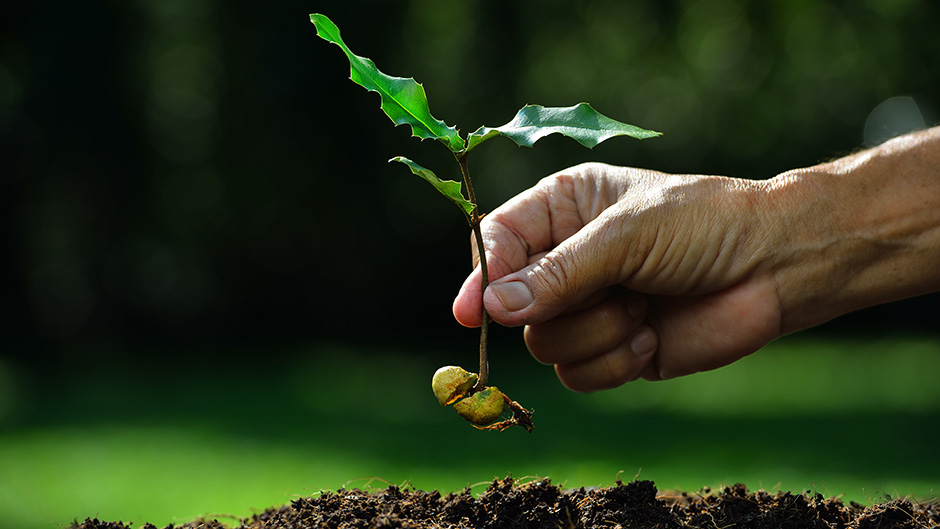Aalt Dijkhuizen, 62, started his career in science and became a professor of Animal Health Economics at the University of Wageningen. Following this, he moved into private business and became a managing director at Nutreco, a listed company specialising in high-quality animal and fish feed. Between 2002 and 2014 he was President and Chairman of Wageningen University and Research Centre. Aalt sits on the advisory and supervisory boards of several international food and agribusiness companies. Since 2014 he has been a President of Dutch Topsector Agri & Food.
Based on its strong market position and experience in the sector, what advice can the Netherlands offer to help countries prepare for increasing food demand?
The strength of the food and agribusiness sector in the Netherlands has grown over many decades. This is exemplified through the fact that the Netherlands are now the second largest food exporter in the world, after the United States of America. Our strengths are not limited to one sector; we have a strong presence in numerous key agribusiness industries, particularly horticulture, poultry, pork and dairy. Professional development across the value chain is a significant area of focus which is currently being supported by a diverse range of companies throughout the sector including farmers. The agricultural conditions in the Netherlands help to strengthen the country’s agribusiness industry. For instance, our climate and fertile soil are extremely beneficial for agriculture. High prices for land and labour have forced us to improve production and work efficiently. Through a combination of these factors we have been able to become a successful producer. We have a long term commitment to the sector and have extensive knowledge in the areas of management, production, smart marketing and sales.
What is the ‘secret’ behind the comparatively high productivity of Dutch agriculture?
The ‘secret’ is the large competition for land in the Netherlands. To stay ahead of competitors we need to be productive and efficient, which requires smart and significant investments. A good example is one of the largest Dutch greenhouses in a small village called Wieringen. The vast greenhouse spreads over 250 hectares. Many millions of Euros have been invested into lighting alone; this is in addition to the building cost of the greenhouse and its climate control systems.
“The ‘secret’ is the large competition for land”
Such a project would not have been possible without receiving financing from the banks. It is important for the growth of the industry that financial institutions have confidence in agribusiness and extensive knowledge of the sector. This in turn allows us to keep up with foreign competition. An excellent research and development base and high-quality management are also very beneficial.
How can the Netherlands maintain a leading knowledge position while at the same time sharing its knowledge with the other countries?
Continuous improvement is necessary. This is shown by being eager, trying to find new solutions before anyone else and being constantly prepared to look for new opportunities. Dutch agribusiness entrepreneurs have that in their genes. I am a farmer’s son and have witnessed that farmers are always searching for improvements.
The sector has small margins, as soon as you lose on costs or don’t innovate swiftly enough you lag behind competitors. It is not only about buying the newest equipment; history and tradition determine a lot too. Germany has a strong car industry because it has been building up knowledge and experience over several decades. In the Netherlands, we have tried to build this in the past with the DAF car factory. The brand did not generate popular appeal and was unsuccessful. We have learnt that across industries, it is usually the strongest players in the field that are able to grow and successfully develop their businesses.
Having said this, the Netherlands is always open to sharing knowledge and technology. If you are afraid of sharing information you cannot benefit from the knowledge possessed by others. Good products and production systems will become better through the sharing of information. After all, the Netherlands is not able to produce food for the whole world, so cooperation is essential.
In which geographical locations are the greatest business opportunities for the Netherlands?
The Netherlands exports most of its produce to nearby Germany. Growth markets nowadays are further away. The Asian economies continue to grow rapidly and are developing ever stronger purchasing power. China, in particular, is a source of significant opportunity. There is also a growing market in Africa but the continent’s position as a purchasing power is in its early days. The focus there is more on governmental intervention rather than private sector business development. The countries in South America, especially Brazil, have an established export-import link with the USA. There are nonetheless opportunities for us, for instance, the horticulture sector is growing rapidly in Chile and Colombia. In all these countries the local economy has a large influence on the development of the food and agribusiness sector. Overall, the demand is becoming greater for highquality protein such as dairy, meat and vegetables. This shift is brought about by the growing middle classes, who are choosing to spend more on their diet.
What is the role of Food Valley NL in the Netherlands?
It is a sector platform, also described as ‘the golden triangle’, which brings together the key stakeholders in business, government and science. In the Netherlands we take this type of approach for granted, but most other countries do not have such a platform. Of course innovation and productivity do not come as a result of the existence of the platform itself, they have to be brought about by the various companies and organisations. For example, in the case of China, the focus is still primarily on the government, with private sector involvement in agribusiness being less advanced. Through the golden triangle we are able to innovate more quickly than other countries. I visit China frequently. The Chinese are keen to adopt this structure and often ask how to start such a platform and how to encourage stakeholders to contribute.
What is the role and responsibility of Dutch universities (such as Wageningen) in stimulation of innovation, research and development?
I am not aware of a ‘Second Wageningen’. By this I mean another university completely focused on the food and agribusiness sector, and closely connected to a large applied research center. Most universities have specialist food and agribusiness faculties, such as UC Davis and Cornell University in the USA.
“‘A 2-3% increase of productivity is necessary each year’”
Wageningen is important in inspiring the next generation of agribusiness innovators and acts as a frontrunner for research and development in the sector. This system in the Netherlands enables competitors to learn from each other. Just as the IT sector has Silicon Valley, the food and agribusiness sector has Food Valley. Within this, Wageningen University acts as an important facilitator for the continual exchange of information and innovation. The geographical location is also very 04 Norton Rose Fulbright – February 2016 Cultivate appealing for young professionals and academics. It has the facilities required by the students, employees and families alike. We work hard to get the best people from outside the Netherlands. The national and regional governments provide support and fund these facilities.
What are the examples of the current promising research and technology development?
To keep ahead of our competitors the entire portfolio needs to be strong. Across the sector we see many initiatives, the latest trends and developments are:
- Smart farming – this includes the increasing incorporation of technology and robotics into the production process, and the use of GPS for machinery. The ‘big data’ that comes out is used to optimise production. This technology is in the early stages of its development. It is expected that over the next 10 to 15 years this will be the biggest revolution in the sector, with phenomenal benefits being seen in numerous areas.
- Genomics – by this I do not mean GMOs. Darwin was the founder of the production of different species with xenogamy. Only in recent years have we been able to follow up on this with genomics. We are conducting genetic research to establish which seeds and breeds are to be used for the next generation, in an attempt to weed out weaknesses in the genes of plants and animals, which make them more vulnerable to diseases. Genomics is also an important factor for personal nutrition. For both the short and long-term it is essential to understand the effect that dietary factors may have on your genes and how this may vary from person to person.
- Bio-refinery technology – this technology enables the extraction of value from waste and other animal or vegetable by-products, for example, energy, chemical products or animal feed. Livestock is not only valuable for meat, but also to process manure into energy and animal feed. Sugar beets are a fantastic product too. You can make sugar out of the beet, while the leaves and the roots can be used to produce energy and green chemistry ingredients.
How important is having a large scale operation to be successful in achieving increased productivity?
The definition of ‘large scale’ varies from country to country. In the Netherlands 200 cows is a large farm, but in New Zealand 450 cows is seen as the average (and still pasture based). That said, to implement most new technologies you need sufficient scale. The new generation of farmers also tend to opt for larger scale where the necessary technology is available; as the returns are higher and it is more fun to work with. I think if we are able to send astronauts to space then we are definitely able to bring robots onto our fields. Technology will then deliver control behind the scenes and will allow us to optimise input and output. For that to be a possibility, the next generation will have to invest in smart technology. This is why innovation takes a long time in agribusiness; large investments and the transfer of businesses from one generation to another are required. It will take a long time before we will really begin to benefit from the introduction of the new technology and knowledge into the business. Will that be in time to feed the required number of people?
How can we meet demands to successfully feed a larger world population?
Ensuring security of food production is difficult but we can overcome this problem. A 2-3% increase of productivity is necessary each year. Therefore, we need to constantly work on solutions and search for new opportunities. On the positive side, people are willing to invest in the sector because there is an increasing demand for food in the market. We have to be confident that we will develop new technologies and solutions because while it is not impossible, we cannot miss a single day. If we can increase the amount of productivity in the Netherlands, we can also do it in the less developed countries. In the Netherlands the new technologies will also help to produce more food in a more efficient manner.



